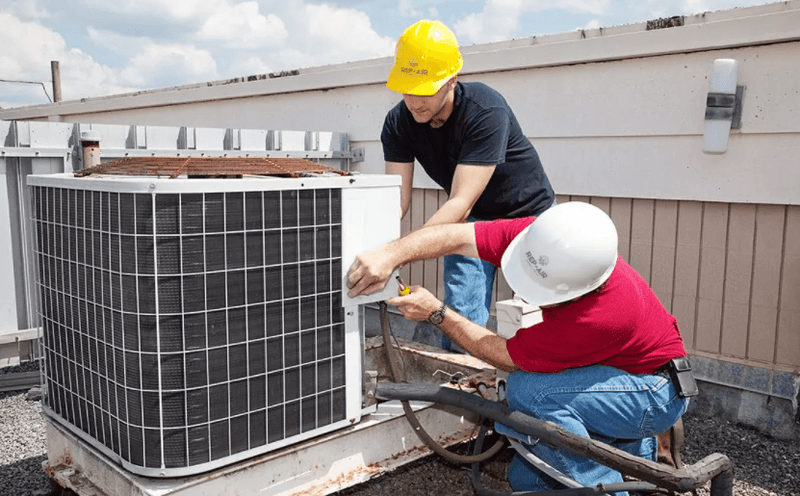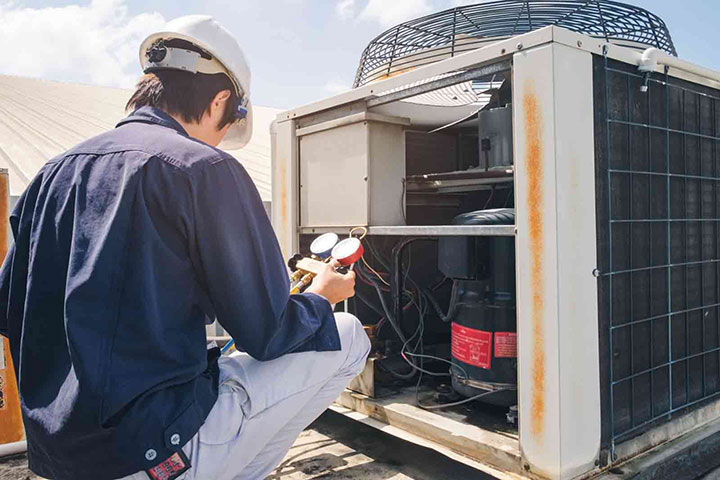Checking Out the Essential Components of an Effective A/c System
An effective a/c system is built on a number of vital components that function in consistency. Each component, from the thermostat to the ductwork, plays a crucial duty in maintaining comfort and power performance. Understanding these aspects is critical for enhancing performance and boosting indoor air high quality. As one takes a look at these components, the intricate connections between them expose understandings right into boosting total system efficiency. What particular aspects contribute most to this effectiveness?
The Duty of the Thermostat in A/c Effectiveness

Frequently overlooked, the thermostat plays a vital role in the performance of HVAC systems. This little tool works as the primary nerve center, controling temperature level setups and making sure optimal convenience within a room. By accurately picking up the ambient temperature level, the thermostat communicates with the air flow, air, and home heating conditioning devices to preserve the preferred climate
An effective thermostat minimizes power usage by triggering the heating and cooling system just when essential, thereby avoiding extreme home heating or air conditioning. Modern programmable and wise thermostats boost this efficiency additionally by enabling customers to set schedules and remotely adjust settings, adjusting to daily routines.
Moreover, the placement of the thermostat is crucial; inappropriate place can bring about imprecise temperature level readings, leading to ineffective operation. On the whole, a well-functioning thermostat not just enhances comfort yet likewise adds substantially to power financial savings and the durability of the cooling and heating system.
Comprehending the Importance of Air Filters
Air filters serve an essential feature in a/c systems by ensuring that the air flowing within a space stays healthy and balanced and tidy. These filters trap dust, irritants, and other contaminants, preventing them from being recirculated throughout the atmosphere. By capturing these fragments, air filters add to improved indoor air top quality, which can significantly benefit residents' health, specifically those with allergies or breathing conditions.
Additionally, preserving tidy air filters boosts the efficiency of HVAC systems. Stopped up filters can limit air flow, creating the system to work harder to keep wanted temperatures, resulting in raised power consumption and higher utility expenses. Regularly changing or cleaning up filters is an essential upkeep step that can prolong the life expectancy of cooling and heating tools. Eventually, comprehending the significance of air filters allows homeowners and building managers to take positive actions to guarantee a well-functioning, reliable cooling and heating system that promotes a safe and comfy indoor setting.

The Performance of the Furnace and Warmth Pump
Heaters and heatpump are vital components of a/c systems, in charge of providing warmth during colder months. Heating systems run by heating air with burning or electric resistance, after that dispersing it throughout the home through air ducts. They generally use rapid heating and can be sustained by natural gas, power, or oil, depending upon the system kind.
Alternatively, warmth pumps transfer warmth instead of generate it. They remove warm from the outdoors air or ground, even in low temperature levels, and move it inside your home. HVAC experts. This dual functionality permits heat pumps to also provide air conditioning in warmer months, making them versatile alternatives for year-round climate control
Both systems require appropriate upkeep to assure performance and long life. While furnaces master extreme cool, heatpump can be advantageous in moderate climates. Comprehending their distinct functionalities aids homeowners in picking one of the most ideal choice for their heating needs.
Discovering the Air Conditioning Unit
The cooling system is a vital part of a/c systems, available in numerous types to suit various requirements. Understanding the efficiency ratings of these units is necessary for making educated options regarding energy usage and price. This area will discover the diverse sorts of air conditioners and clarify how performance scores impact efficiency.
Sorts Of Air Conditioners
While numerous elements influence the choice of cooling systems, understanding the various types available is crucial for house owners and building managers alike. Central air conditioning conditioners are made to cool down entire homes or buildings, making use of a network of ducts for airflow. Home window devices supply an even more local option, perfect for solitary spaces or little spaces. Mobile ac system supply versatility, permitting users to move the system as needed. Ductless mini-split systems are one more option, combining the performance of main systems with the convenience of zoning, as they need no ductwork. Finally, geothermal systems harness the earth's temperature level for energy-efficient air conditioning. Each type features distinct benefits, making informed choices important for effective environment control.

Performance Scores Explained
Recognizing efficiency rankings is necessary for selecting the right a/c system, as these metrics provide insight into the system's efficiency and power consumption. The most usual score for air conditioners is the Seasonal Energy Performance Proportion (SEER), which determines the cooling result throughout a normal air conditioning season split by the overall electric energy input. A greater SEER suggests better performance. Furthermore, the Energy Performance Proportion (EER) is made use of for measuring performance under specific conditions. One more crucial metric is the Power Celebrity qualification, which indicates that a system satisfies stringent energy effectiveness standards. By examining these rankings, consumers can make enlightened his response choices that not only optimize convenience however also minimize energy costs and environmental impact.
The Importance of Ductwork and Air flow
Effective ductwork design and air movement monitoring play critical functions in the general performance and performance of heating and cooling systems. Correct ductwork guarantees that conditioned air is distributed uniformly throughout a space, reducing temperature level variations and boosting convenience. Well-designed air ducts minimize resistance to air movement, lowering the work on HVAC equipment and ultimately decreasing power intake.
Air movement administration includes strategically placing vents and signs up to improve the flow of air. This stops common issues such as warm or chilly spots, which can take place when air movement is blocked or improperly balanced. Additionally, the ideal duct products and insulation can even more enhance efficiency by minimizing warmth loss or gain during air transportation.
An effective ductwork system not just adds to energy cost savings but can additionally extend the lifespan of cooling and heating tools by decreasing unnecessary strain (HVAC experts). Consequently, understanding the relevance of ductwork and air flow is essential for accomplishing peak heating and his comment is here cooling system efficiency
Normal Maintenance Practices to Improve Efficiency
Routine maintenance methods are essential for ensuring peak efficiency of HVAC systems. These techniques consist of routine inspections, cleansing, and needed fixings to keep the system running efficiently. Regularly transforming air filters is crucial, as stopped up filters can block airflow and lower effectiveness. On top of that, service technicians need to examine and tidy evaporator and condenser coils to avoid overheating and energy waste.
Yearly expert assessments are likewise suggested, as experienced technicians can identify possible issues before they rise. Oiling moving parts lessens damage, contributing to a longer life expectancy for the system. Furthermore, ensuring that the thermostat operates appropriately aids in maintaining optimal temperature control.

Often Asked Inquiries
Exactly how Frequently Should I Change My Thermostat?
Thermostats must commonly be replaced every 5 to ten years, depending on use and innovation improvements. Routine checks are advisable to ensure peak performance, particularly if experiencing irregular temperature level control or boosted energy prices.
What Size Air Filter Is Finest for My HVAC System?
The ideal size air filter for a cooling and heating system differs by unit design. Commonly, it's crucial to speak with the owner's guidebook or examine the existing filter dimensions to ensure peak efficiency and air top quality.
Can I Set Up a Warm Pump Myself?
Setting up a heat pump individually is possible for skilled people, yet it requires knowledge of electrical systems and regional codes. Employing an expert is suggested to guarantee proper installment and ideal system performance.
Just how Do I Know if My Ductwork Is Effective?
To identify ductwork performance, one need to look for leaks, action air movement at vents, check insulation quality, and review temperature level distinctions in between supply and return ducts. Specialist evaluations can offer complete insights right into total performance.
What Are Indicators My Heating And Cooling Needs Immediate Upkeep?
Signs that a HVAC system requires immediate maintenance consist of uncommon noises, Bonuses inconsistent temperatures, raised energy bills, undesirable odors, and constant cycling. Addressing these issues immediately can protect against further damage and guarantee optimal system efficiency.
Air filters serve an essential feature in HVAC systems by ensuring that the air distributing within a space stays healthy and balanced and clean. Additionally, maintaining tidy air filters enhances the efficiency of Heating and cooling systems. Ductless mini-split systems are one more choice, combining the performance of main systems with the ease of zoning, as they require no ductwork. Understanding effectiveness scores is necessary for selecting the right air conditioning unit, as these metrics give insight right into the system's efficiency and power usage. The ideal size air filter for a Heating and cooling system varies by unit layout.